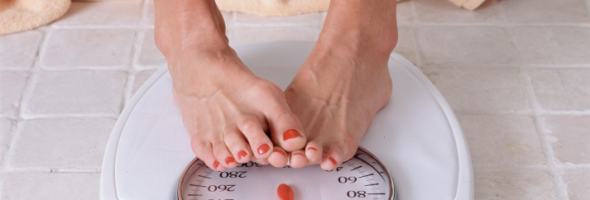Weight Loss May Require a Little Less Loathing and a Lot More Love

Poor body image plagues the young adults of Generation Y and may even be preventing us from reaching our weight loss and healthy lifestyle goals.
A recent study out this month in the International Journal of Behavioral Nutrition and Physical Activity has shown that improved body image may lead to improved weight loss. In this randomized controlled trial, the treatment group that participated in group sessions covering topics such as emotional and external eating and improving body image and acceptance lost an average of 7% of their body weight after one year compared to the control group which averaged less than a 2% loss of their body weight. The body image intervention aimed to increase participants’ body acceptance and satisfaction, and decrease their preoccupation and investment in their appearance. The study concluded that body image is important to address in weight control programs.
This really makes a lot of sense if you think about it. Several factors are included in the big equation to living a healthy lifestyle, including the regulation of eating behaviors. By regulation, I mean not overindulging in food and also not severely restricting caloric intake. I’m talking about that happy medium in between that can often be so difficult to reach! But our own negative body image may actually be making that goal even more difficult to obtain.
Research has repeatedly shown that body image plays a huge role in eating behaviors and can also predict disordered eating patterns. Body image problems are highly prevalent in overweight and obese people, and a negative self-image is actually a positive predictor of poorer weight outcomes and increasing chances of relapse.
Poor body image is also associated with the adoption of unhealthy weight control strategies (i.e., severe calorie restriction) as well as binge eating. Furthermore, many models of bulimia nervosa cite body image concerns as having the most causal role in disease development.
Something I found particularly interesting in this recent study is the discussion of two different dimensions of body image that combine to form one’s total body image, and the importance this may play in weight loss. First, there is evaluative body image which refers to one’s personal appraisals and associated emotions about their own appearance. Second, there is body image investment referring to the importance that one places on their own appearance. Both of these components of body image are found to predict eating disturbances, however, it is body image investment that presents the greatest predictive power for the development of disordered eating that goes above and beyond that of only body dissatisfaction.
Of course, these “ideal” and often unobtainable body images, as well as the great importance we tend to place on them, don’t come out of nowhere. They come from the sociocultural pressures we are surrounded by in the media. Check out the video below for a great perspective on it regarding women. I’m sure the media has an “ideal” unobtainable body image for men also.
So what do we do about it? Simply ignoring sociocultural pressures is a difficult task. But I think self-awareness of the issue is a great start. As this study concludes, efforts to improve body image appear to be crucial in designing and implementing weight loss plans. So if you are trying to eat healthier and lose weight, don’t let a poor body image sabotage your goals. A little less loathing and a lot more love can go a long way!
Posted under Featured, Uncategorized by hollyonhealth















